Every human has feelings to a certain degree or another.
Most of us understand the display of feeling in others, and so when we encounter music – which is a means of depicting emotion through sound – we “get it”.
However, being able to get that emotion to come out of our fingers or our voices is often a challenge.
This is one of my favorite parts on the subject of Performance Anxiety. While I’m not going to cover specific aspects of how to play or sing musically or with affect (feeling), I will touch on the ways on how getting into the feeling of the music can help with the fears of performing.

Inner Dialogue
The term “inner dialogue” is what I use to refer to the conversations we have in our head as we are performing. Similar to the “inner judges” that Eloise Ristad refers to in her book, Soprano On Her Head, these voices are clearly our own voices speaking to us, and another part of our minds responding back. It may go something like this:
“Oh shoot, I screwed up that measure again.” “Ya, that really sucked. And I worked so hard on it, too!” “I wonder what the audience thinks now?” “Ya, I bet they’re all just hoping I finish soon so they can get on to hearing the better musicians play…”
Any of this sound familiar? And usually it is soon followed by another mistake. Why? Because in the time it took for those thoughts to happen, more music happened. And guess who was driving? Our dear friend, Mr. AutoPilot! But there’s an even more egregious error than giving the wheel to Mr. AP: we weren’t focusing on the music!
Let’s follow this line of thinking a bit here. As I said before, music is the expression of emotion through sound. To whom are we expressing? When we are alone, we are expressing to ourselves. But when you stick another person in the room, or even a recording device, suddenly we struggle to do the same thing. So clearly when we “perform” it is different than playing alone. Our expression shifts from emoting to oneself to then emoting to an audience.
So why do we go to hear a performance? Do we go to hear perfectly executed staccati or flawless finger 4-5 trills? Not exactly, I don’t think. Those things are means to an end, right? They allow the musician to express the emotion underlying the piece. Those are not ends in and of themselves. Rather, we want to be moved by a performance; we want to feel something from it. Not just be a by-stander as someone plays whatever tickles their fancy but says absolutely nothing to the audience. We also don’t want to be witnesses of a person dismantling themselves in a performance because of the inner dialogue and having the wrong focus.
Both situations are uncomfortable – at best – for the audience and leave them wanting it to be over soon.
And while both have the same result (non-communication of emotion), they come from two opposite ends of the spectrum. The first – a person playing however they like without thinking of the audience or the music – is someone who essentially doesn’t care about their audience. To them, performing is an act of self-indulgence. I don’t need to say much about these people, since this isn’t in the scope of performance anxiety. But the other extreme – the person who is so wrapped up in their inner dialogue that they can’t say anything to their audience – is a huge contributor to anxiety.
So what do you do when you realize you’re talking to yourself while performing?
It is very similar to what I talk about in Part 2: Preparation with regards to shutting up the judges: you first must recognize that you’re doing this. Having your little cues as to what comes next in the music is helpful also in drawing your mind back to the present matter at hand.

You will need to fill your mind with something, however, or it will automatically go back to the inner dialogue stuff, which is anything but the music. You must fill the void you have created with your musical expression.
It goes something like this:
Your mind says, “My hands are shaking again,” and, “Why is that person playing with a cough drop wrapper? Just put the darn thing in your mouth already!” Then you recognize the inner dialogue is occurring and divert your attention to the next cue in the music, which is the beginning of the development section where you play the A major chord. You then transition to how the music of this section makes you feel, and play it as expressively as possible.
How does this work exactly? Well, thing is, it takes a lot of brain power to focus on being expressive and to also have those mental cues popping in, so there’s really no room for the other stuff.
Most likely, the inner dialogue begins because you are not focusing on sharing your piece and being expressive to begin with, so then there’s nothing for your brain to do, and it wanders and gets into trouble with Mr. AP. The best way to avoid it, of course, is to not let it happen at all. But since this is a process, that will come (but maybe never 100%). But whenever you turn your mind back to loving to share your music and what this music makes you feel, then all of a sudden you’re back into communicating your emotion.

Join me next time when I delve into how to change your Perspective while performing as a means of combating Performance Anxiety.
What kinds of things do you find yourself distracted by when you perform? Have you ever been successful at redirecting your mind in a performance? I’d love to hear about your experiences, so feel free to comment below!


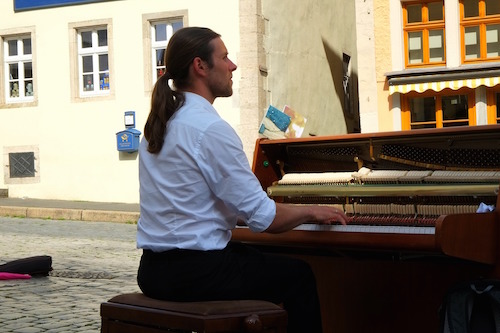
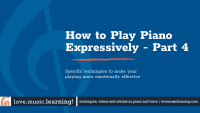
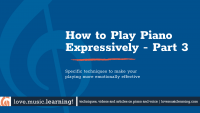
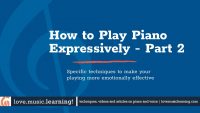
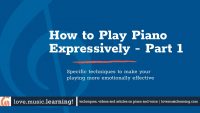


Leave A Comment
You must be logged in to post a comment.